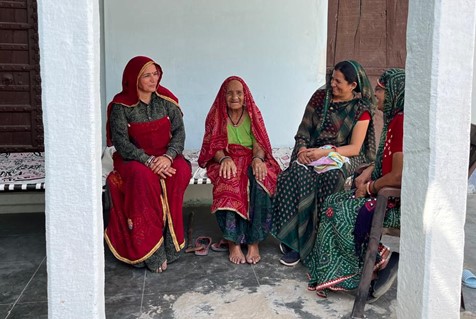Empowering Women, Enriching Communities: Waves of Change in Sikar, Rajasthan
“Earlier, water was scarce in our village. I used to go somewhere inside another village, 10-15 minutes away from here and then wait another half an hour to collect water,” shares Barji Devi, a 40-year-old Anganwadi worker from Rajpura village, Sikar, Rajasthan. This sentiment captures the day-to-day struggle of a rural woman in a water-scarce region.
Sikar, a vast district located in the arid expanse of Rajasthan, has long battled the relentless challenge of water scarcity. With erratic rainfall patterns and over-exploitation of land, the community faced severe socio-economic issues. Moreover, the scant water supply was tainted with high fluoride levels, rendering it unsafe for consumption. Traditional wells and ponds further dried up, leaving residents in a desperate plight. Forced by necessity, many families have had to leave their homes, migrating to the cities in a bid to secure better livelihoods.
In the midst of this crisis, Anandana – the Coca-Cola India Foundation and SARA, an NGO based in Sikar, came together to improve the resource scarcity as well as uplift the community through a water sustainability initiative. They implemented a sustainably transformative project to construct check dams and ponds in the parched villages across Sikar, a lifeline for a rural society. These structures not only significantly enhanced the freshwater resources and replenished groundwater levels, but also boosted agricultural productivity with improved irrigation practices. Aligned with the Government of India’s Jal Shakti Abhiyan: Catch the Rain 2024 campaign, this effort has emerged as a ‘flow’ of hope and sustainable development for Sikar.
The impact has been nothing short of remarkable. The construction of check dams and ponds has facilitated the rejuvenation of over a billion liters of water, directly benefiting more than 18,000 people in the district. Farmers, who once struggled with severe water shortages, now cultivate their fields with renewed confidence, growing multiple crops every year. This newfound water security has led to increased incomes and livelihood generation, reviving the local economy and community.
Moreover, the lives of many women have been positively impacted following the implementation of this initiative and in every household, stories of transformation unfold. Barji Devi, for instance, not only witnessed upward growth for agricultural yields but also saw her life improve with the time saved that she previously spent collecting water from distant localities. “Now there is a tap in each household,” she says, reflecting on the convenience. Now she dedicates majority of her time to grow vegetables and plants like ashok, bail, mogra, and even stitching clothes and decorating her odhni.
The health benefits have rippled through the community like a refreshing breeze. With the introduction of safe, fluoride-free drinking water, the overall well-being of Sikar’s people as well as cattle. Take Gumani, for instance, a 60-year-old farmer from Mangra village, Sikar. She recounts how the pond has not only improved her family’s health but also the vitality of her livestock. “My sheep are now drinking clean water from the pond,” she explains. “Earlier, they relied on tanker water, which was khara (salty). They often fell sick and many even died. Now, thanks to the pond, my sheep are healthier and produce more milk. We’ve been able to expand our herd from 20 to 50.”
Another notable facet of this initiative is the empowerment of women through solar engineering training. Sonu, a 40-year-old from Laxmipura, stands as a shining example of this change. Since 2011, she has worked as a solar engineer, a role that has not only empowered her but also the lives of many others. “In 2011, I received training to become a solar engineer through Anandana – the Coca-Cola India Foundation. After that, I trained 15-20 women, and together, we installed fixed units in the village, such as batteries, lamps, and more. We make solar pumps here and then install them in the village,” says Sonu. This initiative has not only illuminated villages once shrouded in darkness, but has ensured the safety of local livestock by preventing any predator attacks. After the installation of solar lamps in cattle areas, these unpredictable attacks on cattle became a rarity as the glow of solar lamps ensure the security of these animals.
Thus, the collective efforts of Anandana and SARA have not only regenerated water resources in Sikar but have also ignited a spark of empowerment among its women, enabling them to lead more productive and fulfilling lives. This story of transformation reiterates the positive socio-economic impact that sustainable initiatives can have on rural communities, cultivating resilience, enhancing livelihoods, and empowering women to be the change makers in their societies. Through the lens of Coca-Cola India’s #SheTheDifference, Sikar’s narrative stands as a testament to the enduring potential of women in shaping a sustainable future.

